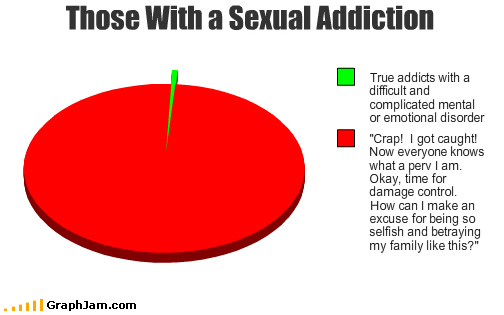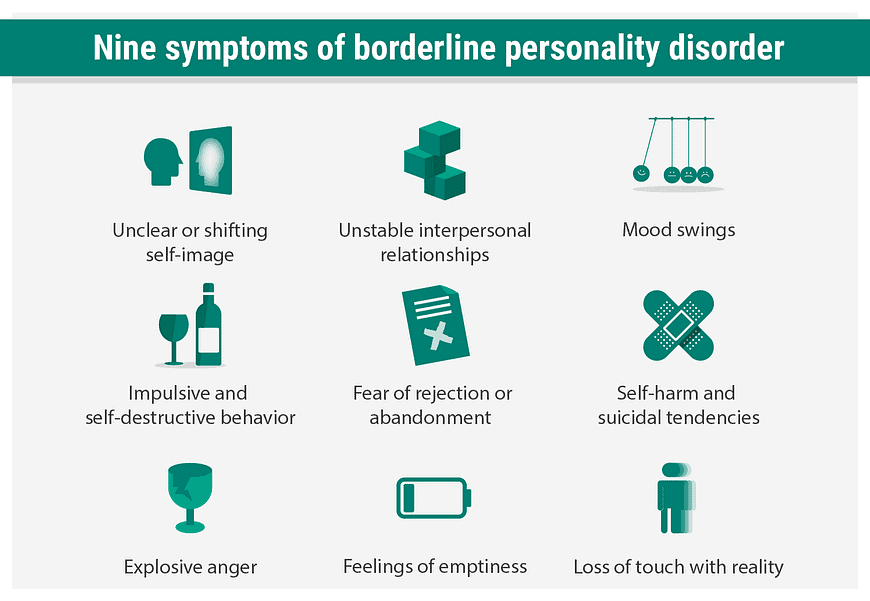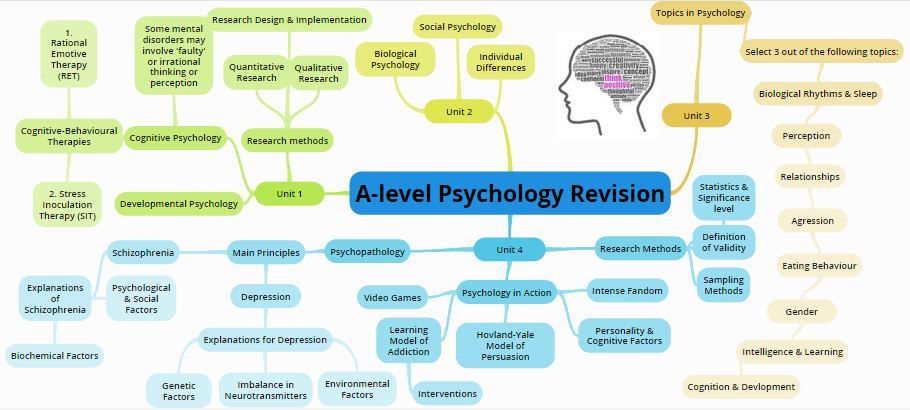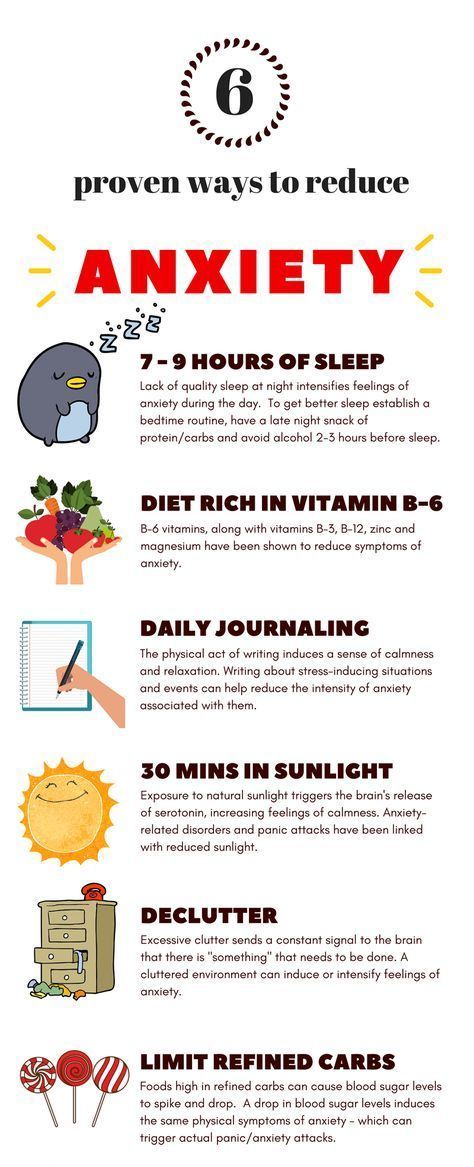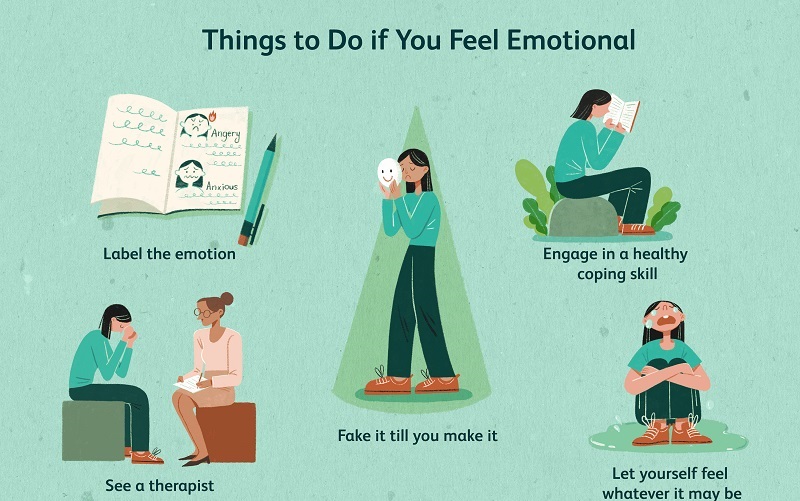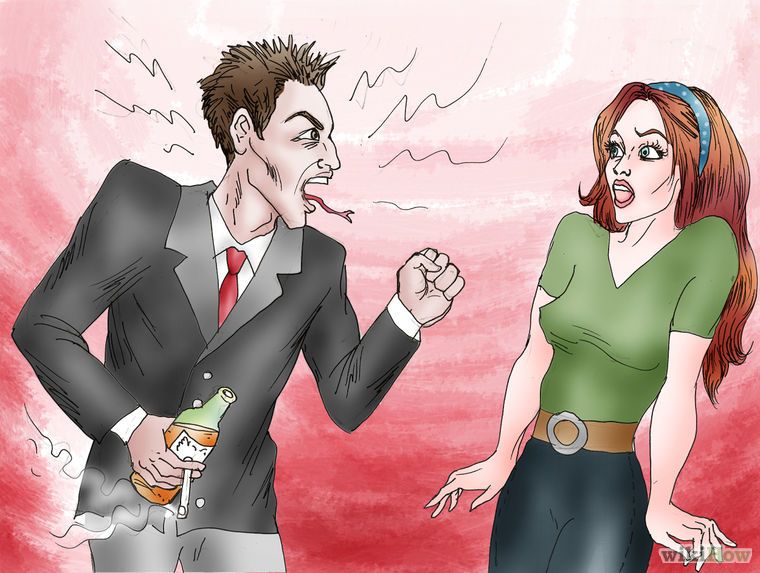Sex addicted people
8 Signs to Look For
Written by WebMD Editorial Contributors
Medically Reviewed by Dan Brennan, MD on December 02, 2020
In this Article
- What is a Sex Addict?
- Signs of a Sex Addict
- Treating Sexual Addiction
What is a Sex Addict?
Sex addiction is defined as a lack of control over sexual thoughts, urges, and impulses. While sexual impulses are natural, sex addiction only refers to behaviors that are done in excess and significantly impact one’s life in a negative way.
Although sex addiction isn’t listed as a diagnosable condition in the Diagnostic and Statistical Manual of Mental Disorders (DSM-5), research indicates that excess sexual behavior can develop, like a chemical addiction.
A person with sex addiction may have a compulsive need to be sexually stimulated. This desire often interferes with their ability to live their daily life. Sexual addictions can come in many different forms, including addiction to:
- Sexual acts
- Prostitution
- Watching or consuming pornography
- Masturbation or sexual fantasy
- Exhibition or voyeurism
Sex addicts may alter their activities to perform sexual acts persistently, unable to control their behavior despite any consequences.
This compulsive sexual behavior can have serious personal consequences. Like drug or alcohol addiction, sex addiction can impact physical health, mental health, personal relationships, and quality of life.
Signs of a Sex Addict
Sexual addiction can manifest itself in many different ways, both physical and emotional. It takes a healthcare professional to make a clear diagnosis, but here are some signs that can point to a potential sex addiction:
Obsessive Sexual Thoughts
Someone dealing with sex addiction may find themselves thinking persistently about sex. These chronic thoughts of sex or sexual fantasies may become obsessive or interfere with other responsibilities.
Spending Excessive Time on Sex
While seeking out sexual partners isn’t necessarily a sign of sexual addiction, if someone is spending excessive amounts of time and energy on sex, it might be a red flag. This can include spending time attempting to acquire sex, having sex, being sexual, or recovering from sexual experiences.
Feeling Shame or Depression
If a need for sex crosses over into an addiction, someone’s sexual feelings might also be interspersed with feelings of anxiety, shame, depression, or regret. The individual may feel shame about their sexual urges and their difficulty controlling those urges.
They may even show signs of clinical depression or suicide ideation. Research shows that it isn't uncommon for people who are sexually compulsive to also show signs of depression, anxiety, and social anxiety. One study found that, among sexually compulsive men, 28% showed signs of depression, compared to 12% of the general population.
Excluding Other Activities
A sex addict may fixate on sex to the point where they have difficulty engaging in their other activities. They may fall behind on responsibilities in school, work, or their personal lives or become socially withdrawn. They may also prioritize sexual behavior over other forms of relaxation or hobbies. Relationships with friends, families, and partners may suffer because of this.
Relationships with friends, families, and partners may suffer because of this.
Masturbating Excessively
While masturbation can be a healthy way to explore sexuality and express sexual drive, excessive masturbation can be a sign of sexual addiction. This might look like compulsive masturbation, masturbation during inappropriate times, or even masturbation to the point of causing physical discomfort or pain.
Engaging in Risky or Inappropriate Behaviors
In some cases, sexual addiction can lead to inappropriate and/or risky sexual behaviors. This can include exhibitionism, public sex, sex without protection, and sex with prostitutes.
In some cases, this can lead someone to develop sexually transmitted diseases. Studies have shown that those who identify as sexually compulsive are more likely to develop sexually transmitted diseases like HIV.
Cheating on Partners
Someone with a sexual addiction may feel compelled to seek out sex with new partners, even if this means cheating on a partner or having an extramarital affair. They may seek out one-night stands on a regular basis or even cheat multiple times with different partners.
They may seek out one-night stands on a regular basis or even cheat multiple times with different partners.
Committing Criminal Sex Offenses
In some extreme cases, people may engage in criminal activities like stalking, rape, or child molestation. While some sexual offenders may also be sex addicts, there is no evidence that sexual addiction can lead someone to commit sexual offenses.
Treating Sexual Addiction
Can a sex addict change? Yes, although it may require treatment from a medical professional like a psychologist, psychiatrist, or sex therapist.
Depending on the underlying cause and how it manifests in someone’s personal life, treatment may vary. If the sex addiction presents alongside another underlying anxiety disorder or mood disorder, the treatment plan may also include medications.
Forms of treatment can include:
- One-on-one therapy with a mental health professional
- Cognitive Behavioral Therapy (CBT)
- Eye movement desensitization and reprocessing (EMDR)
- Psychodynamic therapy
- Group therapy
- Support groups
- Inpatient treatment
- Couples counseling or marriage counseling
SAMHSA’s National Helpline | SAMHSA
Your browser is not supported
Switch to Chrome, Edge, Firefox or Safari
Main page content
-
SAMHSA’s National Helpline is a free, confidential, 24/7, 365-day-a-year treatment referral and information service (in English and Spanish) for individuals and families facing mental and/or substance use disorders.

Also visit the online treatment locator.
SAMHSA’s National Helpline, 1-800-662-HELP (4357) (also known as the Treatment Referral Routing Service), or TTY: 1-800-487-4889 is a confidential, free, 24-hour-a-day, 365-day-a-year, information service, in English and Spanish, for individuals and family members facing mental and/or substance use disorders. This service provides referrals to local treatment facilities, support groups, and community-based organizations.
Also visit the online treatment locator, or send your zip code via text message: 435748 (HELP4U) to find help near you. Read more about the HELP4U text messaging service.
The service is open 24/7, 365 days a year.
English and Spanish are available if you select the option to speak with a national representative. Currently, the 435748 (HELP4U) text messaging service is only available in English.
Currently, the 435748 (HELP4U) text messaging service is only available in English.
In 2020, the Helpline received 833,598 calls. This is a 27 percent increase from 2019, when the Helpline received a total of 656,953 calls for the year.
The referral service is free of charge. If you have no insurance or are underinsured, we will refer you to your state office, which is responsible for state-funded treatment programs. In addition, we can often refer you to facilities that charge on a sliding fee scale or accept Medicare or Medicaid. If you have health insurance, you are encouraged to contact your insurer for a list of participating health care providers and facilities.
The service is confidential. We will not ask you for any personal information. We may ask for your zip code or other pertinent geographic information in order to track calls being routed to other offices or to accurately identify the local resources appropriate to your needs.
No, we do not provide counseling. Trained information specialists answer calls, transfer callers to state services or other appropriate intake centers in their states, and connect them with local assistance and support.
-
Suggested Resources
What Is Substance Abuse Treatment? A Booklet for Families
Created for family members of people with alcohol abuse or drug abuse problems. Answers questions about substance abuse, its symptoms, different types of treatment, and recovery. Addresses concerns of children of parents with substance use/abuse problems.It's Not Your Fault (NACoA) (PDF | 12 KB)
Assures teens with parents who abuse alcohol or drugs that, "It's not your fault!" and that they are not alone. Encourages teens to seek emotional support from other adults, school counselors, and youth support groups such as Alateen, and provides a resource list.After an Attempt: A Guide for Taking Care of Your Family Member After Treatment in the Emergency Department
Aids family members in coping with the aftermath of a relative's suicide attempt. Describes the emergency department treatment process, lists questions to ask about follow-up treatment, and describes how to reduce risk and ensure safety at home.
Describes the emergency department treatment process, lists questions to ask about follow-up treatment, and describes how to reduce risk and ensure safety at home.Family Therapy Can Help: For People in Recovery From Mental Illness or Addiction
Explores the role of family therapy in recovery from mental illness or substance abuse. Explains how family therapy sessions are run and who conducts them, describes a typical session, and provides information on its effectiveness in recovery.For additional resources, please visit the SAMHSA Store.
Last Updated: 08/30/2022
7 signs of sexually addicted people
Sexual addiction, or "hypersexuality", is a term that is not very clear to most people. Some, when they hear the word "sexy", immediately call themselves addicts, because they think it's very cool. It seems like a sexaholic - it means that you are a good lover, and you can and know everything, and you have more partners than Genghis Khan had mistresses, and all of them are necessarily beautiful, like supermodels. And here it is not.
And here it is not.
Hypersexuality as a human norm lasts a very short period - youthfulness - after which it can be safely considered a serious mental disorder. You need to understand that love for sex and sexual addiction are completely different things. Most sexually mature people love sex, and this does not prevent them from living and interacting with other people at all. But sexaholism is a completely different phenomenon. Here, a person around the clock is captivated by a single thought - about sex. At the same time, the sexual act itself no longer brings them pleasure, but becomes a necessity for further existence. Sex addiction, despite its seeming innocence, is a behavior in which not only the addict suffers, but also those around him, friends and family. We have identified for you several signs by which you can calculate a sexaholic.
They are always late
Sexaholics lose their sense of time, which causes them to be constantly late. Certified narcologist and founder of the Institute for Sexual Recovery in the USA, Mike Weiss, believes that "regular delays can be evidence of addiction, including sexual addiction. This happens because with any addiction, the rest of life fades into the background and ceases to seem important to a person."
This happens because with any addiction, the rest of life fades into the background and ceases to seem important to a person."
They lie
Of course, as the unforgettable Dr. House said, everyone lies. But the sexaholic lies especially. When it comes to sex, his (or her) lies will be very coherent, correct and verified in seconds - the habit of hiding has made them brilliant actors. They know what excuse is best now, what you will believe and how to present all these lies correctly. If a sex addict does not try to fight with himself, then most often he becomes a pathological liar, even outside of sexual activity. His lies seem to him more logical and attractive than the real world, and over time, most sexually addicted people can no longer distinguish truth from their own fiction.
They love unprotected sex
It is clear that almost every guy at least once said the well-known sacramental phrase about a condom and a gas mask, and every girl rolled her eyes after that. True, for all normal people, common sense defeats ridiculous prejudices, and they protect both their own health and the health of their partner. But not just sex addicts. In 99% of cases, they flatly refuse to use any method of contraception, especially condoms. They are not afraid of disease or accidental pregnancy. Are you ready to take such risks and rely on chance? We don't think.
True, for all normal people, common sense defeats ridiculous prejudices, and they protect both their own health and the health of their partner. But not just sex addicts. In 99% of cases, they flatly refuse to use any method of contraception, especially condoms. They are not afraid of disease or accidental pregnancy. Are you ready to take such risks and rely on chance? We don't think.
They pay for sex
Sooner or later, any sexually addicted person realizes that paying for sex is much easier than just finding a partner. It can be both real and virtual (on the Internet or by phone) sex. The main thing is that "after" you can not explain anything.
They masturbate before, during and even after sex
Over time, even the best partner ceases to give pleasure to the sexaholic. Then endless self-satisfaction begins. Sexologists assure that such behavior has no personal overtones in relation to the partner. It's just that sexually addicted people, like people with any other addiction, need an urgent and quick "repayment" of their own needs. Otherwise, they move on to the next stage - irritation.
Otherwise, they move on to the next stage - irritation.
They get irritated when they don't have sex
Sex addicts really can't live without a "fix" of sex. Their addiction, like any other, leads to instability, uncontrollable anger and sometimes incapacity. For such people, sex ceases to be just a pleasure, it becomes necessary for them simply in order to be able to calmly be in society for a while. The more dependent a person is, the less time he can think about anything other than his own satisfaction.
If you suspect your partner of being sexually addicted, it is. For example, if at some point you noticed excessive secrecy on the part of a partner or some qualitative changes in his / her behavior. Psychologists in such cases are advised to trust yourself.
Yes, individually, all of the above can occur in perfectly healthy people. However, if you or your friend have noticed at least a few points at once, then you may need to contact a specialist. Sex addiction is a rather complex problem, although it is not officially considered a disease. It is difficult to diagnose it, because this dependence is not always manifested outwardly, an addicted person can behave absolutely normally. However, this does not mean that the problem does not exist. Timely help from a psychologist or sexologist can prevent a lot of problems associated with sexaholism.
Sex addiction is a rather complex problem, although it is not officially considered a disease. It is difficult to diagnose it, because this dependence is not always manifested outwardly, an addicted person can behave absolutely normally. However, this does not mean that the problem does not exist. Timely help from a psychologist or sexologist can prevent a lot of problems associated with sexaholism.
Is there a sexual addiction?
Share
0Historical attitude to the issue
Science has always looked at human sexuality with caution. During the Enlightenment, they still tried to treat her with a naturalistic interest, but by the 19th century, European scientists began to associate open manifestations of desire with promiscuity or illness.
In those days, getting the status of a sex addict was not so difficult, because even natural needs were viewed with suspicion. Some scientists believed that women "do not have sexual feelings at all. " Others denounced clitoral stimulation, considering only vaginal sex to be normal. So women who expressed inappropriate desires could be recognized as nymphomaniacs.
" Others denounced clitoral stimulation, considering only vaginal sex to be normal. So women who expressed inappropriate desires could be recognized as nymphomaniacs.
Masturbation has been associated with the development of various diseases, such as ossification of the joints and epilepsy. One of the most implacable fighters against self-satisfaction was the American physician John Harvey Kellogg. As a method of getting rid of a dangerous disease, he advocated circumcision and suturing to prevent erection in men and cauterization of the clitoris with carbolic acid in women.
Find out the truth 🤗
- Masturbation: myths and facts
Even today's breakfasts are connected with the struggle against baser instincts: it was Kellogg who invented corn flakes. You can thank him for this, but the doctor sincerely believed that eating cereal reduces libido (unlike meat, which supposedly sets you in a frivolous mood).
However, over time, scientists came to the conclusion that human sexual needs are evolutionarily determined, and therefore quite natural and do not require draconian measures of suppression.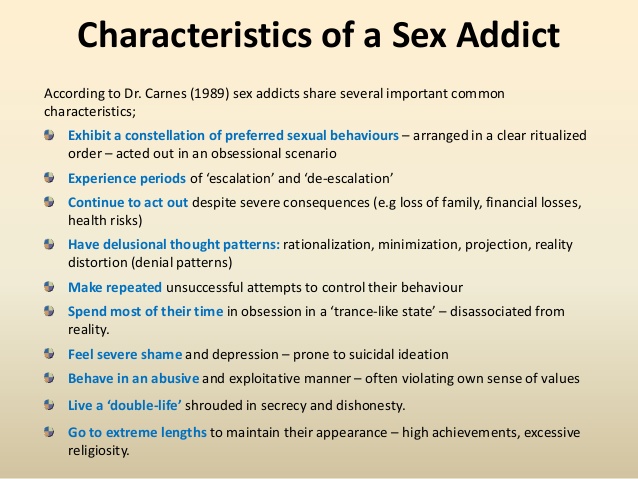 But the level of hormones and the learned strategies of behavior are individual, so questions about how sexually active you need to be still arise.
But the level of hormones and the learned strategies of behavior are individual, so questions about how sexually active you need to be still arise.
Is there a norm
Illustration: Anastasia Pruss / LifehackerEverything can change
It is not so easy to say unambiguously what is normal and what is not. After all, even during the life of the same person, the degree of interest in sex varies.
Allocate pubertal hypersexuality. Teenagers are especially obsessed with sex, which makes perfect sense in a changing, hormone-filled body. People during puberty are characterized by increased excitability and obsessive thoughts about sex. As a rule, with the end of puberty, these manifestations disappear and sex remains an important, but not the main component of impulses and thoughts.
Adolescent hypersexuality is characteristic primarily of men, and in women the attraction is especially strong after 30 years. Although, of course, these are average data, and for specific people everything is different.
In addition to age, environmental and lifestyle factors can significantly affect libido.
Corn flakes are unlikely to prevent you from experiencing attraction, but alcohol abuse is very much so. Sometimes desire decreases against the background of taking antidepressants, as well as due to internal hormonal disorders. Also, sexual temperament is harmed by a systematic lack of sleep.
On the other hand, playing sports helps to increase the desire. So if you want your hormones to work more actively, add moderate exercise to your schedule.
People have different libidos
It's hard to say how much sex and masturbation you need to have for this to be considered normal. Often our ideas about what indicators to equal are imposed from the outside. However, in personal life, everyone can set their own rules. The temperament of all people is different. For someone, several times a month or even a year are enough, while someone needs a discharge much more often. The main criterion here is subjective comfort and agreement with a partner or partners.
The main criterion here is subjective comfort and agreement with a partner or partners.
In addition, there are asexuals who do not need sexual relations at all. But they can also be very different. Some, in principle, do not experience attraction and excitement, others simply do not want sex with other people, but practice masturbation.
Nor is it possible to set a standard for the number of sexual partners.
According to statistics for 2005, the average number of partners throughout the life of respondents around the world turned out to be 9. At the same time, in the United States, each person had an average of 10.7 sexual partners, and, say, in Indonesia - 5.1. Of course, we are talking about averages per capita. Someone keeps celibacy, and someone has dozens of partners. It is also important to consider that in such surveys, people often report incorrect data, trying to impress others with sexual victories or, conversely, not wanting to appear licentious.
When sexual activity is harmful
Illustration: Anastasia Pruss / LifehackerOnly a person can determine what is normal for him and what is not. At the same time, behavior should not become destructive and lead to obvious bad consequences. There are several signs that indicate that a problem exists and needs attention.
A person tries to quit, but cannot
The principle “no complaints, no diagnosis” works here in many respects. If your own body does not cause discomfort to a person and does not prevent him from building mutually satisfying relationships with other people, he will have no reason to go to doctors. But several attempts to control their sexual behavior, which ended in failure, are a wake-up call. It can signal that outside help is really needed.
Obsessive-compulsive behavior occurs
A person develops obsessive thoughts and desires, which he tries to cope with with the help of special actions (compulsions) - often exhausting, unpleasant or humiliating. For a while they help, but then everything starts all over again.
For a while they help, but then everything starts all over again.
Some people with obsessive-compulsive disorder feel the need to wash their hands dozens of times a day, others touch stationary objects or perform other rituals that drown out anxiety. For people with sexual compulsions, sex plays the role of a sedative, and its quality and generally pleasant sensations are far from in the first place.
There is no adequate cycle of sexual response
Not all sex has to end in orgasm, but the standard cycle of human sexual response includes the path from excitement to discharge. People with sexual disorders may experience compulsions beyond their capacity. That is, desire persists even in the absence of physical arousal, and sexual activities do not lead to orgasm. Nevertheless, the person insistently continues to try (this, by the way, is fraught with injuries to the genital organs).
Research the problem 🍌
- Anorgasmia in men: what to do if you can't reach orgasm
There is a threat to health and safety
Sexual activity should not lead to distress. This is the name of a negative type of stress that disrupts the functioning of the immune system and other body systems. If sex becomes so important that it prevents a person from taking care of himself or makes him forget about protection and possible negative consequences, something has gone wrong.
This is the name of a negative type of stress that disrupts the functioning of the immune system and other body systems. If sex becomes so important that it prevents a person from taking care of himself or makes him forget about protection and possible negative consequences, something has gone wrong.
The rights of others are violated
Whatever we want, the free will and health of others should never be endangered. A person who commits sexual harassment or violence is dangerous to others and breaks the law.
If you find one or more of the listed symptoms, you should contact a specialist - a psychotherapist or a sexologist. There are also support groups for sex addicts.
Is it a disease or not
Illustration: Anastasia Pruss / LifehackerWhat medical classifications say
The World Health Organization's International Classification of Diseases (ICD) does not diagnose sex addiction. Nevertheless, in the ICD-10 edition there is a diagnosis of "excessive sexual desire" F52. 7. It includes nymphomania and satyriasis, which denote an unhealthy, pathological form of sexual desire in women and men, respectively. However, in modern sexological practice, these terms are rarely used. We are talking about an obsessive, painful craving for the person himself, which leads to potentially traumatic actions.
7. It includes nymphomania and satyriasis, which denote an unhealthy, pathological form of sexual desire in women and men, respectively. However, in modern sexological practice, these terms are rarely used. We are talking about an obsessive, painful craving for the person himself, which leads to potentially traumatic actions.
In 2019, for the new version of the handbook, ICD-11, the item “compulsive sexual behavior disorder” was prepared. It talks about the impossibility of a person to control his attraction. At the same time, the craving for sex leads to recurring episodes that are harmful in social, work and family life.
Separately (although not mentioned in the ICD) is porn addiction - obsessive sexual activity using pornographic materials. It becomes a problem when it takes up so much space in life that it calls into question physical, mental, social well-being. The negative symptoms of excessive interest in porn are depression, social isolation, loss of a career, and large expenditures of money.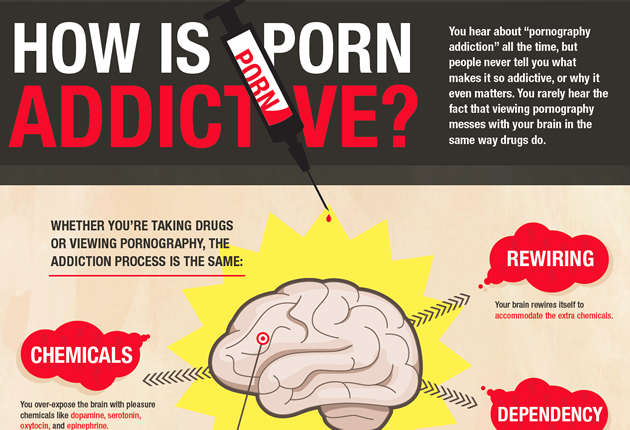
To be considered a problem in its own right, hypersexuality must not be the result of other mental disorders and addictions.
Increased sexual excitability is characteristic, for example, of bipolar disorder in the phase of hypomania or mania, as well as substance abuse.
What doubts exist
Some doctors doubt that sex addiction should really be considered a medical diagnosis. Classical addictions, such as alcohol and drugs, involve a withdrawal syndrome. This means that after giving up the object of craving, a hangover or withdrawal occurs. At the same time, people who claim to be sexually addicted definitely experience pain in abstaining from compulsive sex (the same support groups are aimed precisely at preventing relapses).
The compilers of the latest edition of the ICD suggest that we do not yet have enough scientific research to draw an unambiguous conclusion and equate sex addiction with the rest. In addition, the medicalization of the problem may raise ethical objections and legal issues.
After all, if sex addiction is a disease, then harassment and violence can be its symptoms. And the one who commits them should not be judged, but treated, because he does not control himself and cannot be held responsible for his actions.
For example, in 2017, actor Kevin Spacey went to an elite clinic for treatment for sex addiction, which also treated producer Harvey Weinstein.
This approach raises a number of ethical questions and opens up the possibility of abuse. Can we tell for sure whether a person commits harassment because of an irresistible impulse, or simply because he had the power and opportunity to harass with impunity? Of course, lawyers will insist on the first.
What is the result
Not every person who needs a lot of physical intimacy is a sexaholic. Often having sex with an attractive partner is completely normal. But regularly and against one's own will to seek erotic adventures, and even more so to violate other people's rights, is already problematic behavior.